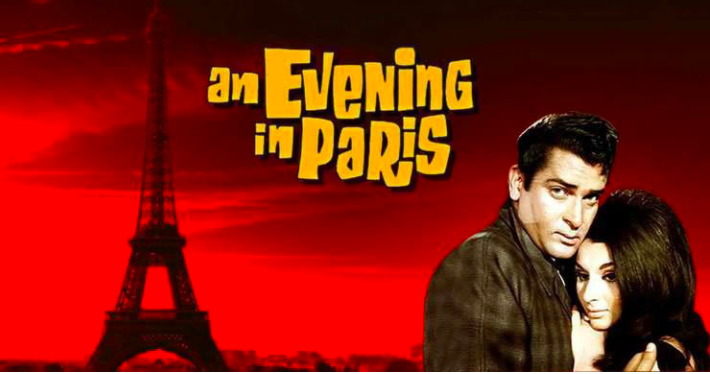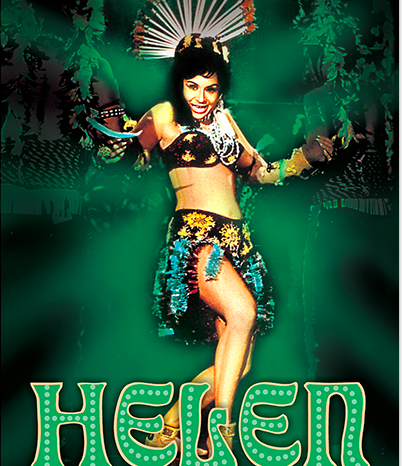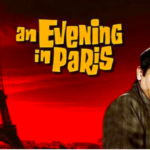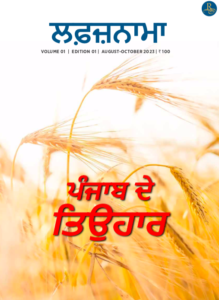An Evening in Paris (1967)

…and a day or two in Beirut (plus an afternoon in the Lebanese countryside, masquerading as provincial France). A couple of days in Switzerland, and a grey afternoon at the Niagara Falls. Lots of Paris, of course, from the Eiffel Tower and the Champs Elysées, to the bateau mouche and pretty little cafés.
And Sharmila Tagore. And Shammi Kapoor. And pretty mad masala.
What with reading about Amar Akbar Anthony (and thinking over the lost-and-found trope), I ended up thinking, too, about An Evening in Paris, which is a good enough example of the genre. In this one, Sharmila Tagore is the one who plays the character(s) who’re lost: twin sisters, separated as children, thanks to a villain. They grow up unaware of each other’s existence, and in classic Hindi film style—ranging from Anhonee to Sharmeelee—with one sister good and the other bad, or at least not-so-good.
 The film begins by introducing us to the good sister, Deepa (Sharmila Tagore), on a flight from Delhi to London [which, by some inexplicable diversion, lands her in Paris, but never mind. It’s just a preview of how this film goes all over the place].
The film begins by introducing us to the good sister, Deepa (Sharmila Tagore), on a flight from Delhi to London [which, by some inexplicable diversion, lands her in Paris, but never mind. It’s just a preview of how this film goes all over the place].
Deepa, we are told, is a very wealthy heiress, who—at 23 years of age, with three failed romances behind her—has come to the conclusion that Indian men are not to be trusted. All of them are after her for her money; none of them really love her. So she’s headed for Paris to find true love.
At the airport in Paris, Deepa is received by two people: the ‘Pariswaale chaacha’, Mr Damodar Dayal (David), who has been employed by Deepa’s father to look after her and her fortune; and the driver-cum-general dogsbody, Makkhan Singh (Rajendra Nath, nutty as only Rajendra Nath can be). Deepa immediately warms to both of them, and also to Honey (Sarita), the maid and companion whom the Pariswaale chaacha has employed to attend to Deepa.

Deepa soon opens her heart [even sooner, actually, than she opens her luggage] to Honey, telling her about her cynicism re Indian men. Honey offers a suggestion: if Deepa is looking for true love, she should pretend to be poor. The two girls decide to pretend that the luxurious flat they’re living in belongs to Honey and that Deepa is her maid.


To add a touch of verisimilitude to this, Makkhan Singh goes out and buys an Indian naukraani’s outfit [read: bright ghaghra-choli-odhni, with lots of accessories and jewellery] for Deepa to parade around in.
Clad in this completely impractical and unconvincing attire, Deepa goes out to simper on the streets of Paris. Very soon, she’s accosted by a rather naïve [or simple-minded, whatever] Frenchman named Louis, who—because he shares accommodation with an Indian, knows Hindi. [It’s an advantage to be a Hindi-speaking Indian in a foreign land. No matter where you are, you’ll always find someone who speaks your language].

Louis doesn’t stop to wonder at the incongruity of a ‘very very poor’ Indian maid who speaks good English, is loaded down with costume jewellery, and is traipsing around Paris. He’s too bowled over for that, and after a swift proposal [these Frenchmen think on their feet]…
…races off to tell his Indian buddy Shyam Kumar ‘Sam’ (Shammi Kapoor, who else?) all about it. When Sam hears about this Indian girl who’s going about tarring all Indian men with the same brush, he decides to do something about it.

This, sadly, consists largely of cutting out poor Louis’s chances of getting married to Deepa. With Louis out of the way, Sam approaches Deepa [who, by now, is an elegant and wealthy looking confection of embroidered sari, chic jewellery and perfect bouffant; she’s obviously decided there’s no point remaining in ghaghra-choli for a Frenchman stupid enough to believe that].
Sam introduces himself as a Frenchman (who’s lived 20 years in India, hence his familiarity with Hindi). He tries to chat with Deepa, but she gives him the cold shoulder.

In the meantime, another suitor enters the lists. This is the Pariswaale chaacha’s slimy son Shekhar (Pran, for some unexplained reason wearing an orangey-yellow wig that does nothing for him). Shekhar, we discover from a brief scene where he tries to borrow money from his upright and honest father, is neck-deep in debt. Debt, too, which he’s incurred because of an uncontrolled love for gambling. Daddy is sick of trying to keep Shekhar on the straight and narrow.

…and Shekhar, having discovered that Deepa is wealthy, decides that the best way to pay off his debts is to marry an heiress. He starts buttering Deepa up, and our heroine [who literally has ‘more hair than wit’, as Georgette Heyer would’ve described it] laps it all up. To be fair, not because Deepa finds Shekhar extremely attractive, but because she wants to make Sam—who’s lurking in the background—jealous.

This being a Shammi Kapoor film, the quintessential picnic takes place (with Shammi, disguised as an Arab named Hukku Pasha, gate-crashing it). This is followed, shortly after, by another Shammi-film-fixture, the Youth Festival in an Exotic Place. In this case, the venue is Switzerland, which allows:
(a) Deepa to go there to do ‘charitable work’, as a Red Cross nurse [I had no idea you could up and become a nurse in a jiffy, no training required]
(b) Shekhar to trail along and inflict his company on Deepa whenever she isn’t working [which seems to be almost always]
And, (c) Sam to trail along, sing songs, and generally indulge in some stalkerish behaviour.

By the end of the day, Deepa’s brain has been so addled by being chased up and down the Jungfrau by her two suitors, she allows Shekhar to get her drunk dead as the dodo. Shekhar takes Deepa to his room and is getting ready to have his wicked way with her—

—when the US Cavalry arrives! [No, well. Not really; just figuratively]. Sam, aided by the faithful Makkhan Singh, phones Shekhar, and (without revealing his own identity) threatens to do a lot of very nasty things if Shekhar doesn’t come down to the lobby ASAP. Shekhar, in a flap, begs ‘Jaggu’ not to do anything rash. ‘Please, Jaggu,’ he pleads. ‘I’d spoken to Jack, and promised him that I’d pay the money back in a month’s time.’ There are some rather puzzling (to Sam) references to people being killed, etc. This is all very odd, and Sam doesn’t have a clue.
The end result, however, is what Sam wished for. Shekhar scurries down from the room, leaving the coast clear for Sam and Makkhan Singh to rescue the semi-conscious Deepa, whom they take to Honey’s room to sleep it all off.
The next morning, when Sam—who’s slept nearby, keeping a careful but very proper watch—awakes, he finds Deepa gone. She’s left behind a note, to say thank you to Sam and to tell him how ashamed she is, and how she will never be able to show her face to him again.

Meanwhile, down in the lobby, Shekhar has met Jack (KN Singh, wearing, like Pran, an odd wig), and is pleading for some more time to pay Jack.
In the middle of this, Deepa—accompanied by Honey, and on her way out of the hotel—enters the lobby, and Jack is surprised: Suzie? He accosts Deepa by that name and is swiftly rebuffed. When (with Deepa having gone) Jack turns to Shekhar for an explanation, a surprise emerges. Suzie, says Jack, is the Oriental dancer at their night club.

We’re introduced to her too [she obligingly begins her song with “I am Suzie!”]. Suzie, as anybody with half a brain would have guessed by now, is the spitting image of Deepa. Except, of course, she is a bad girl [no good girl would prance around in a nightclub with too few clothes and a jewel in her navel]. Dance over, Suzie comes over to flirt with Jack. Jack introduces her to Shekhar, and when Suzie’s bustled off to change, he tells Shekhar his plan: to kidnap Deepa and ask for a huge ransom.

And where is Deepa? Holidaying in Lebanon, where (along with Honey) she’s trying to get over Sam [and making a bad job of it]. Barely has she started to miss him, though, before Sam’s arrived too—and how!
The long and the short of it is that Sam and Deepa are soon an item. All seems tickety-boo.

But no; Shekhar turns up one day at Suzie’s place with a proposition. Both of them, he tells her, are under Jack’s thumb; if they gang up and strike out on their own, they can break free of Jack. And set themselves up for life, with more money than anyone can imagine. All Suzie has to do is impersonate Deepa after Jack’s kidnapped the heiress.
Suzie, to whom the sound of 10 lakh dollars (the sum Shekhar promises will be hers) sounds very attractive indeed, agrees. She spends the next couple of days in Shekhar’s company, quietly spying on Deepa, learning to be Deepa. So that, when the time comes for Deepa to be kidnapped, Suzie can quietly slip into her place and nab all her money.

And all this, barely halfway through the film.
The 60s were the period of bling in Hindi cinema. Bling, not just in fashions (more on that when I’m discussing Sharmila Tagore’s costumes in An Evening in Paris), but in a more general sense, of style and oomph and all that was aspirational. For the average Indian moviegoer, going abroad was pretty much a pipe dream, so Hindi film-makers offered the vicarious pleasure of a ‘phoren’ trip: through films. Singapore (also starring Shammi Kapoor) was (one of?) the first to be filmed abroad, but it was with colour that this type of film came into its element, because it could show audiences the world in all its Eastman glory.
Some of these films had ‘social/family drama’ as themes, but the usual was a combination of romance and crime thriller (sometimes spy thriller): Aankhen, Prem Pujari, Night in London, Love in Tokyo—and An Evening in Paris. All chockfull of exotic locations, puzzled-looking foreigners who weren’t extras, and Indians in odd wigs, pretending to be foreigners—or not.
All of it not necessarily great cinema, but certainly a fun (and inexpensive) way to travel abroad without going further than the nearest cinema hall.
What I liked about this film:
The music. The Shammi Kapoor gang, Shankar-Jaikishan, gave An Evening in Paris some superb songs, from the catchy Hoga tumse kal bhi saamna and the still-popular Aasmaan se aaya farishta, to the beautifully echoing Akele akela kahaan jaa rahe ho. There’s the title song, there are two nightclub songs (Le jaa le jaa mera dil and Zooby zooby je l’aime vous, the latter particularly seductive); and there is the gloriously romantic Raat ke humsafar, which is my favourite song from the film.
Besides the fact that the songs have good tunes, I like the picturisation of Hoga tumse kal bhi saamna, Deewaane ka naam toh poochho, Akele akele kahaan jaa rahe ho, and Aasmaan se aaya farishta. Shakti Samanta—who directed An Evening in Paris—went all out with Aasmaan se aaya farishta, using everything from a helicopter and a motorboat to dozens of extras, and Shammi Kapoor matched it by being quite the daredevil, singing suspended from the chopper, or writhing about on the bow of the boat. (Hoga tumse kal bhi saamna, with Shammi and Rajinder Nath swinging their scooters with gay abandon as they whirled down a road, is along the same lines of living dangerously).

Sharmila Tagore and Shammi Kapoor. These are, individually, two of my favourite actors—and, together, they have great chemistry and are easy on the eyes. True, Shammi was going a little over the hill by the time An Evening in Paris was made, but he was still handsome.

And Sharmila, beehive hairdo and overdone eyeliner and all, was simply gorgeous in this film. Her wardrobe was very stylish (Bollywoodeewana, are you listening? Maybe you should do a post on this). Those smart saris, embellished with embroidered or woven borders, teamed with many-stringed pearl necklaces or chokers, heavy earrings and pretty little heels—quite, quite stunning. The Western dresses that Suzie wears are very chic, too.
What I didn’t like:
The meandering nature of the first half of the film. In the second half, An Evening in Paris gets down to business, with the story moving fairly swiftly—but the first half just goes on and on with Sam stalking Deepa and Deepa trying to get him jealous by encouraging Shekhar.
Plus, it’s never too clear about some of the villainy, and the villains don’t always make sense. (Minor spoiler coming up). For example, all those years back, what did Jaggu hope to gain by kidnapping a little girl?
Lastly, the lack of attention to detail. This takes different forms. For example, poor use of extras: near the climax, Shammi Kapoor is shown driving a motorbike, but when the motorbike spins out of control and goes off the road, the man who flies off it is quite obviously a firang extra, and not Shammi. Similarly, in the last few frames, close-ups of Sharmila Tagore (her bouffant a little windblown, but otherwise intact) is interspersed with long shots of an extra similarly clad but with very wet hair.
And what, pray, was a Heliswiss helicopter, with a Bern mark on it, doing near the Niagara Falls?

Still, despite that, a fairly fun film. At least, it’s good on the senses, what with all the eye candy and the good songs. And Suzie is one of the more interesting ‘bad girls’ of 60s Hindi cinema: not completely predictable, and really a more intriguing, resourceful, and feisty character than the relatively vapid Deepa.















